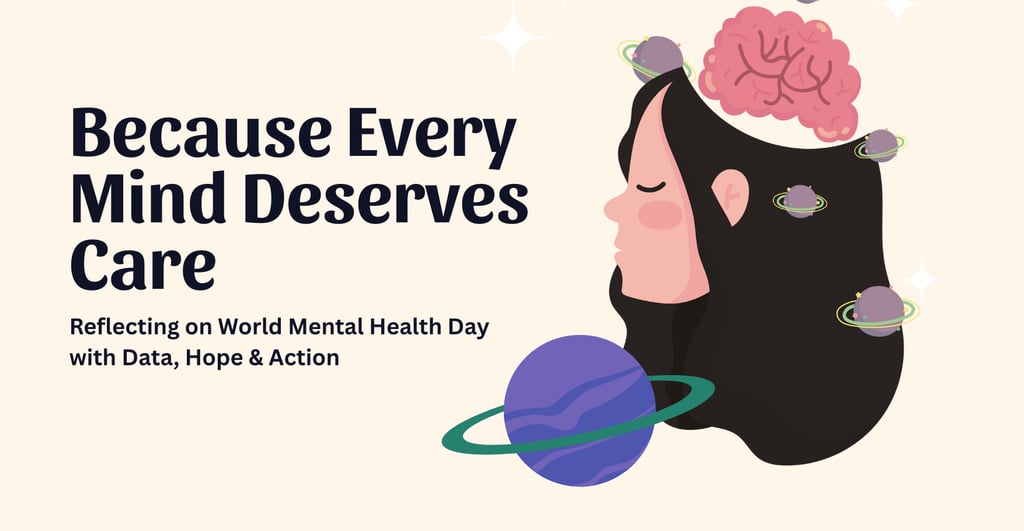1 in 8 People Live with a Mental Health Condition — Here’s Why Action Can’t Wait
Depression, anxiety, and burnout are rising worldwide, yet nearly 75% of people receive no care at all. Backed by WHO and clinical research, this article explores why mental health remains neglected — and what evidence shows can truly make a difference.
10/10/20254 min read


October 10 marks World Mental Health Day — a moment to pause, reflect, and recommit to caring for our collective mental well-being. In a world of rising stressors, isolation, and uncertainty, this is also a moment to lean into empathy, evidence, and action.
The Scale of the Challenge
Globally, over 1 billion people are living with a mental health condition. (World Health Organization)
Depression and anxiety are the most common disorders: approximately 280 million and 301 million people, respectively. (Cambridge University Press & Assessment)
In adolescents (ages 10-19), 1 in 7 experience a mental health condition. (World Health Organization)
Treatment gaps remain vast: many mental health conditions are treatable at relatively low cost, yet most health systems are under-resourced, and large portions of those affected receive no or inadequate care. (World Health Organization)
In conflict-affected settings, prevalence of mental disorders (depression, anxiety, PTSD, etc.) can rise to ~22 % at any one point in time. (PMC)
These numbers aren’t abstractions — they represent millions of people, families, friends, and communities wrestling with emotional pain, distress, and the weight of stigma.
Why So Many Are Left Behind
Understanding the barriers offers direction for meaningful change:
Stigma & Misunderstanding
Many individuals delay seeking help because emotional struggles are dismissed, minimized, or labelled “weak.” Stigma remains one of the greatest hurdles. (PMC)Insufficient Resources & Workforce
The median number of mental health workers globally is only 13 per 100,000 people. In low- and middle-income settings, the ratio can be far lower. (World Health Organization)Fragmented & Underfunded Systems
Despite the growing burden, government spending on mental health has barely shifted; in many places it remains under 2 % of total health budgets. (World Health Organization)Access & Quality Gaps
Even when basic services exist, many lack integration (e.g. within primary care), or have long wait times, poor continuity of care, and uneven quality. (World Health Organization)
What Science Tells Us Works
There is reason for optimism: evidence-based treatments are effective, especially when deployed thoughtfully and accessibly.
Psychotherapy & Pharmacotherapy
A systematic review found that combining psychotherapy and pharmacotherapy often yields better outcomes, though each modality alone also provides significant benefit in improving functioning and quality of life. (PMC)Digital & Blended Interventions
In a randomized clinical trial of digital mental health interventions (mindfulness-based, CBT-based, or personalized feedback), participants showed improvements in depression and anxiety over 6 weeks, with similar effectiveness across modalities. (JAMA Network)
Blended models — mixing in-person and digital (e.g. brief face-to-face + app support) — have also shown efficacy. (mental.jmir.org)Implementation Approaches
Evidence-based psychological treatments (EBPTs) — like cognitive behavioral therapy, interpersonal therapy, etc. — are well validated for many disorders. Yet barriers in dissemination, training, and scaling remain. (PMC)
Addressing social determinants (poverty, discrimination, social support) is increasingly recognized as essential to mental health care. (Nature)Measuring Outcomes
Clinically, scales like the Clinical Global Impression (CGI) are commonly used to assess severity, treatment response, and global improvement in psychiatric settings. (Wikipedia)
A Compassionate Call to Action
On this Mental Health Day, here are ideas to bring empathy and evidence together:
Listen & Validate
Often the most powerful act is being present, open, and non-judgmental. Saying “I see you,” “I believe you,” or “I’m here” can make a difference.Encourage Professional Help Early
Just as we wouldn’t ignore a persistent physical symptom, mental distress merits timely assessment and care.Support Access Innovations
Encourage digital tools, telehealth, stepped-care models, and community-based delivery where in-person services are sparse.Push for System Change
Advocate for increased funding, integrating mental health into primary care, training the workforce, and reducing structural barriers.Attend to Social Context
Recognize the role of economic, social, and environmental stressors and support policies that promote equitable opportunity, inclusion, and resilience.
Closing Thought
Mental health is not an afterthought — it is fundamental to how we live, learn, connect, and build society. On this World Mental Health Day, let us reaffirm: every mind deserves care, and when we support one person, we strengthen the web of human possibility.
References:
World Health Organization. (2025, September 2). Over a billion people living with mental health conditions: Services require urgent scale-up. World Health Organization. https://www.who.int/news/item/02-09-2025-over-a-billion-people-living-with-mental-health-conditions-services-require-urgent-scale-up
World Health Organization. (2023). Adolescent mental health. https://www.who.int/news-room/fact-sheets/detail/adolescent-mental-health
World Health Organization. (2022). Mental health: Strengthening our response. https://www.who.int/health-topics/mental-health
Charlson, F., van Ommeren, M., Flaxman, A., Cornett, J., Whiteford, H., & Saxena, S. (2019). New WHO prevalence estimates of mental disorders in conflict settings: A systematic review and meta-analysis. The Lancet, 394(10194), 240–248. https://doi.org/10.1016/S0140-6736(19)30934-1
Patel, V., Saxena, S., Lund, C., Thornicroft, G., Baingana, F., Bolton, P., & Unützer, J. (2018). The Lancet Commission on global mental health and sustainable development. The Lancet, 392(10157), 1553–1598. https://doi.org/10.1016/S0140-6736(18)31612-X
Cuijpers, P., Karyotaki, E., Reijnders, M., Purgato, M., & de Wit, L. (2021). Psychotherapies and pharmacotherapies for depression: An updated network meta-analysis. World Psychiatry, 20(2), 283–296. https://doi.org/10.1002/wps.20860
Firth, J., Torous, J., Nicholas, J., Carney, R., Rosenbaum, S., & Sarris, J. (2019). The efficacy of smartphone-based mental health interventions for depressive symptoms: A meta-analysis of randomized controlled trials. World Psychiatry, 18(3), 325–336. https://doi.org/10.1002/wps.20673
Rach, J., Rosen, C., & Andersson, G. (2023). Effectiveness of digital interventions for depression and anxiety: A randomized clinical trial. JAMA Network Open, 6(4), e231142. https://doi.org/10.1001/jamanetworkopen.2023.1142
van der Vaart, R., Witting, M., & Riper, H. (2023). Blended care in mental health: A systematic review of effectiveness. JMIR Mental Health, 10, e44742. https://doi.org/10.2196/44742
Kazdin, A. E. (2017). Addressing the treatment gap: A key challenge for extending evidence-based psychological treatments worldwide. Perspectives on Psychological Science, 12(5), 940–951. https://doi.org/10.1177/1745691617709582
Allen, J., Balfour, R., Bell, R., & Marmot, M. (2014). Social determinants of mental health. International Review of Psychiatry, 26(4), 392–407. https://doi.org/10.3109/09540261.2014.928270
